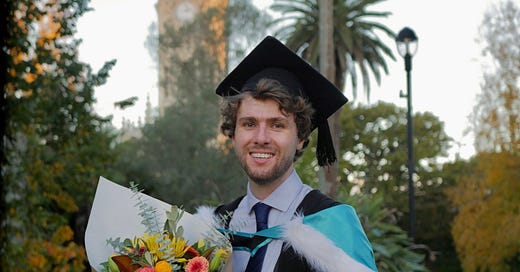Hello from a small hotel room in downtown Lisbon. I’m here to celebrate the end of a huge year.
Looking back, I’m proud of what I have achieved. In June, I handed in my final assignment to conclude my studies at the University of Auckland, and assumed my current role as an editorial fellow at TIME Magazine.
Since then, my work has featured in TIME more than 60 times, including 19 of the 100 profiles for TIME’s list of the most influential people in AI—among them, Marquee Brownlee, whose videos cultivated my interest in technology as a kid; Ray Kurzweil, whose writings on AI piqued my interest in the topic in my first years of high school; and John Jumper, whose contributions to AlphaFold earned him a noble prize shortly after I spoke with him. The role has also taken me from New Zealand to Oxford, New York, D.C., and London, where I now reside.
As the year closes, I'm facing a hard truth: this isn't the end of a sprint. It's the start of a marathon.
This month, OpenAI unveiled a new reasoning model called O3 which blew several benchmarks on complex problem solving out of the water, putting to rest any debate over whether AI progress had slowed (in November I wrote a piece about why we should be slow to assume it had).
Also this month, evidence that OpenAI and rival lab Anthropic’s models can behave deceptively emerged (my colleagues Tharin and Billy each wrote wonderful pieces covering these developments). It came on the heels of a report by several experts, including Turing Award winner Yoshua Bengio, which concluded none of the leading AI developers have the adequate safety measures to be custodians of the general intelligence they seek to create (which I wrote about here). And despite US-led efforts to cut China off from advanced computer chips, the country has made meaningful progress in AI—a development many in Washington and Silicon Valley will no doubt interpret as evidence that America must race ahead to maintain its lead (something president elect Donald Trump has hinted will be a priority for his administration in the few remarks he has made specifically on AI).
Meanwhile, wars continue in the Middle East and Russia-Ukraine. This time next month, Trump will occupy the Oval Office, injecting a dose of unpredictability into both American and International affairs. Korea, who hosted the last international summit on AI in May, is in the midst of its own political crisis. As AI enters what may be an especially pivotal phase, the prospect of meaningful international cooperation looks slim.
However, the speed of development could have a silver lining: it might prompt society to confront the challenges that lie ahead. Either way, 2025 feels like an important year. But tonight if for fun and friends. See you next year!






You've sure come a long way from Ōtautahi, Harry! Super impressed with all your achievements this year...and you're perfectly positioned right in the thick of it, hang on tight, 2025 is going to be some ride I reckon...
Happy new year! Well done on your graduation and beginning your marathon for your future in journalism. ❤️🍾🎉